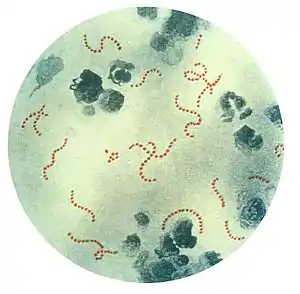Flora (microbiology)
In microbiology, collective bacteria and other microorganisms in a host are known as flora. Although microflora is commonly used, the term microbiota is becoming more common as microflora is a misnomer. Flora pertains to the Kingdom Plantae. Microbiota with animal-like characteristics are classed as microfauna.

Microflora classification
Microflora are grouped into two categories based on the origin of the microorganism.[1]
- Autochthonous flora. - Bacteria and microorganisms native to the host environment.
- Allochthonous flora. - Temporary microorganisms non-native to the host environment.
Roles
Microflora are a community of bacteria that exist on or inside the body, and possess a unique ecological relationship with the host.[2] This relationship encompasses a wide variety of microorganisms and the interactions between microbes. These interactions are often a mutualistic relationships between the host and autochthonous flora. Microflora responsible for harmful diseases are often allochthonous flora.
Projects
In 2008, the National Institutes of Health started the Human Microbiome Project designed to help understand the health implications of human bacterial flora.[3] Biologists believe that bacterial flora may play some role in disorders such as multiple sclerosis. Additionally, the study of flora can have industrial benefits such as dietary supplements like probiotics. The living microorganisms in probiotics are believed to have positive effects on health, and have been utilized in studies regarding gastrointestinal diseases and allergies.
References
- Hao, Wei-Long; Lee, Yuan-Kun (2004), "Microflora of the Gastrointestinal Tract: A Review", Public Health Microbiology, Humana Press, 268, pp. 491–502, doi:10.1385/1-59259-766-1:491, ISBN 1-59259-766-1, PMID 15156063
- Natividad, Toribio; Dial, Julie; Morris, Randal; Nash, Michael; Brunson, Matt; Buford, William; Patterson, Rita; Garges, Kim (2015-03-31). "Abdominal Muscle Activity During Exercise Ball, Machine, and Floor Strengthening Exercises". Texas Orthopaedic Journal. 1 (1): 3–13. doi:10.18600/toj.010101. ISSN 2380-2987.
- "NIH Human Microbiome Project". US National Institutes of Health, Department of Health and Human Services, US Government. 2016. Retrieved 14 June 2016.